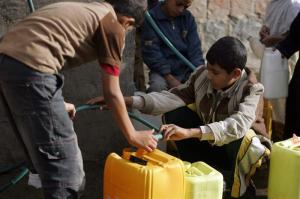 Experts cited by CNN say Yemen could be the first nation to completely run out of water in a few years, a prospect that does not bode well for its young population of 24 million that is expected to double in 20 years, or anyone worried about the rising influence (and ability to get bombs on planes) of an al Qaeda branch in one of the Middle East’s poorest nations.
Experts cited by CNN say Yemen could be the first nation to completely run out of water in a few years, a prospect that does not bode well for its young population of 24 million that is expected to double in 20 years, or anyone worried about the rising influence (and ability to get bombs on planes) of an al Qaeda branch in one of the Middle East’s poorest nations.
In Sana’a, which could be the world’s first capital city to go dry, the population is growing at a rate of 7% per year as people flee from the parched outer reaches of the country. Part of the problem is qat, an addictive plant like chewed by about 75% of men in Yemen that takes a whole lot of water to grow. In places where vineyards used to be, farmers now are growing the more lucrative qat, which uses five times the amount of water as grapes but can be harvested and sold relatively quickly after it’s planted.
Farmers’ ambition to better their lot is more than understandable in a nation where five million people — over a fifth of the population — go hungry each day. And though Yemen’s qat farmers are estimated to now be using some 40% of the nation’s domestic water supply, they are hardly the only actors in this looming crisis. Yemen’s water table is falling about 6.6 feet per year, yet the central government has been ineffective at managing the piecemeal drilling of water wells (the government itself estimates an astonishing 99% of water extraction in Yemen is unlicensed) or regulating water management in more farflung parts of the country. Instead, as Sana’a gets more and more water migrants, authorities have discussed relocating the capital to the coast where they might be better able to take advantage of desalination as other Middle Eastern countries have.
The water shortage is also a global problem, because, like Somalia across the Gulf of Aden, where desertification has been linked with that county’s ongoing conflict, fights and desperation over water in Yemen would be exactly the kind of destabilizing factor that insurgents will need to continue to strengthen their base in remote areas far from the halls of power. As the water crisis has gotten worse, observers have noted that the government has concentrated its efforts to manage water resources in urban centers where it has (and wants to keep) political support, and many of the outlying areas not receiving help have been overlooked before.
As Christopher Boucek of the Carnegie Endowment for International Peace, wrote in testimony to Congress in February: “The failure to establish local water corporations in several governorates that historically have not received much support or social services from the central government has raised fear that a resurgent al Qaeda may seek refuge there.”
Boucek goes on to list what could possibly be done, including stopping government subsidies and public purchases of qat, and constructing a better legal system to deal with the nation’s increasingly scarce resource. “If such measures are not taken in the near term,” he writes, “more dramatic steps will be required in the future, such as stopping rural populations from moving to overcrowded cities, and, more drastically, relocating population centers from the center of the country to the coasts.” In other words, the government will be forced to create a lot more unhappy citizens. And that would make insurgents that find recruits in disgruntled communities very happy indeed.
(Read about Yemen and the top 10 global news stories of 2011.)


